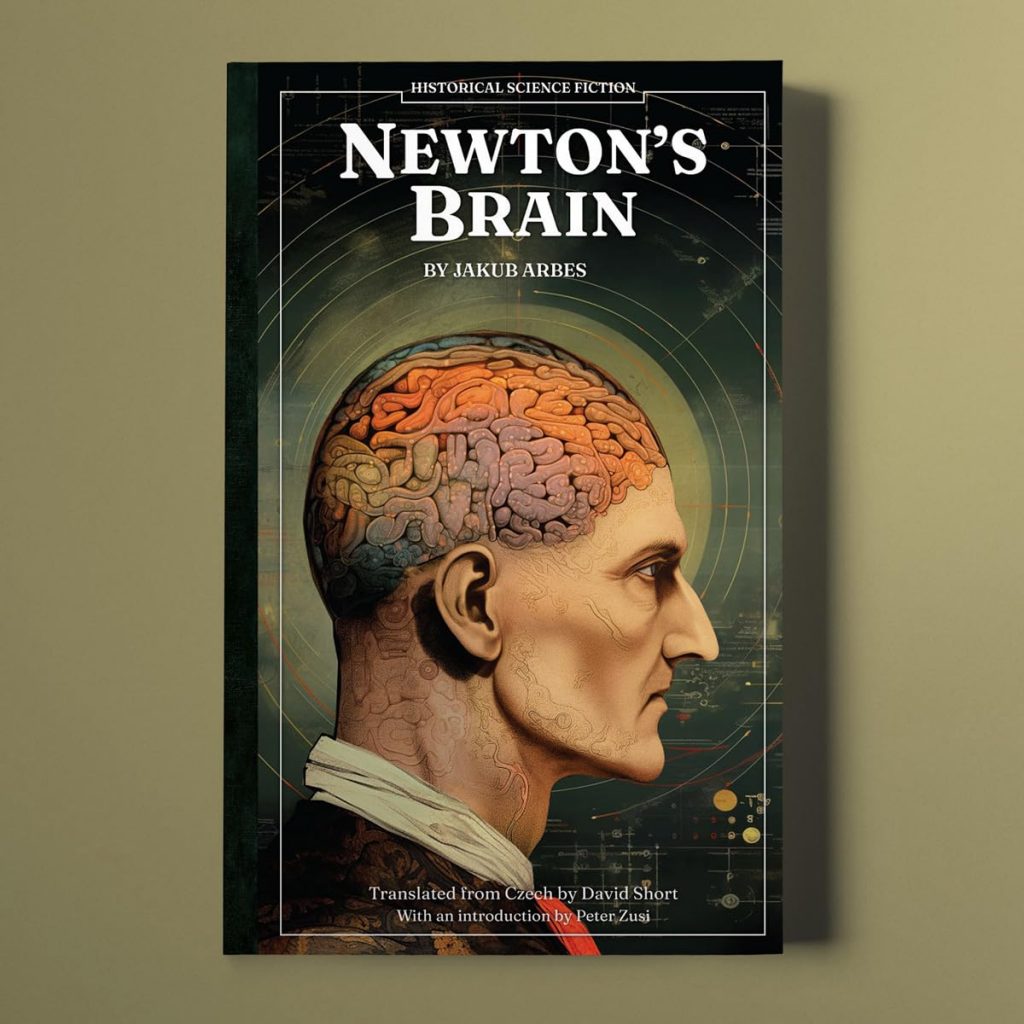
translated by David Short
original publication (in Czech): 1877
first English edition: Jantar Publishing, 2023
grab a copy here or through your local independent bookstore or library
* spoilers ahead
Eighteen years before H. G. Wells published his groundbreaking science fiction novella The Time Machine, Czech author, editor, and journalist Jakub Arbes published Newton’s Brain, a surrealistic, hallucinatory science fiction story (or “romanetto”) about perception, brain transplantation, and time travel. Narrated by an unnamed man, Newton’s Brain chronicles the short life, apparent death, and bizarre reappearance (maybe?) of this man’s friend, Bedřich Wünscher–a magician, scientist, and army officer who dies at the Battle of Königgrätz during the Austro-Prussian War (1866). After narrating some of the magic tricks that his friend liked to play on people when they were schoolboys and explaining the depths of his friend’s intellectual gifts, the narrator tells of how his friend was killed in battle. Indeed, the narrator is contacted to confirm that the dying soldier is, in fact, his friend Bedřich. After seeing his friend with his own eyes, the narrator returns to his apartment, remembering that Bedřich had once told him to gather friends together and drink to him if he should die. Though the narrator tries to get this party together, no one else comes.
One night, however, the narrator hears a carriage pull up and his dead friend appears, inviting him to a banquet at the nearby chateau. Left alone, the narrator is unsure about what just happened, but seeing that, in fact, the lights are on at the chateau, he walks over to the party. Weirdly, the closer he gets to the building, the dimmer the lights, the lower the chatter and music, and the more abandoned it looks. By the time he’s inside, the place looks empty and he then spends hours trapped in an Escher-like series of hallways until he’s exhausted. Suddenly, a door opens to reveal a banquet hall filled with the top intellectuals, politicians, and theologians of the area.
What follows is a series of shocking incidents. First, a coffin appears in front of the guests, containing the very dead body of Bedřich. Next, Bedřich reanimates and sits up, climbing out of the coffin and addressing his guests eloquently on the subject of time and the ability to travel through it by flying faster than the speed of light away from the Earth. As scholar Peter Zusi writes in his introduction to Newton’s Brain, Arbes was likely influenced in this idea by a pamphlet, published in 1846 by Felix Eberty, called The Stars and the Earth; Or, Thoughts Upon Space, Time, and Eternity. This small but sensation-causing pamphlet may have also influenced Kafka and Einstein. Starting with the knowledge that light from the stars comes to Earth after different periods of time (light from the sun takes eight minutes to reach the Earth, etc.), Eberty imagines that if a human were to travel faster than light to certain points away from the planet and then look back with an unimaginably strong telescope, that human would be able to look at past events on his home planet: “With this supposition, and with the aid of a knowledge of the position and distance of every give fixed star […] it will be possible to recal [sic] sensibly to our very eyes, an actual and true representation of every moment of history that has passed” (Eberty, 35-6).
Bedřich then asks for a volunteer to help him prove this idea. Oh, and he was able not only to build upon this thought but construct the necessary materials because he stole Newton’s brain and replaced his own with it. Armed with some very strong goggles and a strange, levitating triangle structure, Bedřich calls for someone to accompany him, and the narrator accepts. Their strange journey through space and time is filled with battle after battle, war after war, demonstrating that conflict marks every period in human history. The triangle ship then hits a snag and the two are tossed around, whereupon the narrator wakes up in his apartment, unsure if any of the night’s events happened at all.
An important, surrealistic work of early science fiction, Newton’s Brain explores the nature of consciousness and perception, whether or not thoughts can be transferred if a brain is moved from one body to another, and how humans might conquer time and space to learn about their past. Thanks to translator David Short and Jantar Publishing, Anglophone readers can now enjoy this fascinating work of Czech science fiction.
